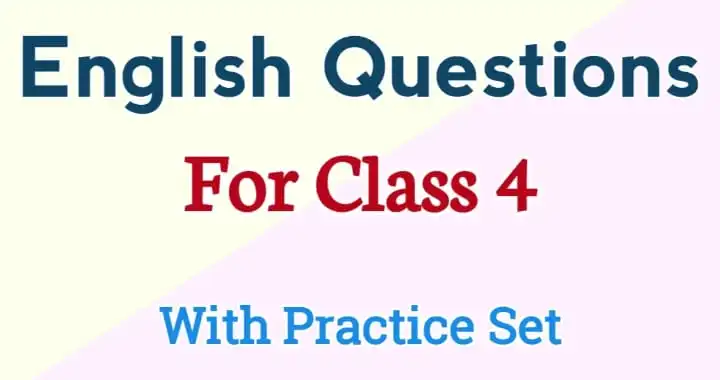English Questions for Class 4 have been provided here in this post that will help the students to be aware of the English question types.
English Question for Class 4
F.M. – 40 Time – 1h 30Min
Section A
Textual Question
1. Answer the following questions. [4×2=8]
(a) What did Jhinuk see after waking up?
(b) Why did the tiger amble away?
(c) How did Swadesh continue to run?
(d) What did Jhinuk see after waking up?
2. Complete the sentence with information from the text. [4×1=4]
(a) A Calcutta bound train was …………………………………………….
(b) Kamots have …………………………………………..
(c) During the afternoon the writer was …………………………………….
(d) Jhinuk had her dinner ………………………………………………
3. Write ‘T’ for true statement and ‘F’ for false statement. [4×1=4]
(a) Nasir pulled Apu to the playground.
(b) The river beyond Basanti is called the Matla.
(c) Jhinuk found only small buildings in the village.
(d) The bag did not contain some unimportant documents.
Section B
Reading Comprehension (Seen)
4. Read the following text carefully and then answer the following questions.
Gogol could see now the actual process of Bengali cooking. He felt a new interest in Bengali food. He ate a hearty lunch of rice and rohu Curry. Then there were rosogollas and sweet card. In the evening, the children sat around Grandma and heard stories. Gogol enjoyed eating peyajis – onion pakoras, a favourite Bengali snack.
The family returned to Kolkata in the evening. It had been an unforgettable day for Gogol. He has realised one important thing about Bengali food. The test of Bengal is closely related with love and care.
A. Now answer the following question. [2×2=4]
a) Why was the day unforgettable for Gogol?
b) Why did Gogol feel interest in Bengali food?
B. Complete the following sentence with information from the above text . [ 1 ]
a) The family returned …………………………………………………….. .
C. Find out a word from the above text which means the following. [ 1 ]
A) Fuifilling …………………………………….. .
Section C
WINGS PART – II
5. Read The Passage And Do The Following Activities :
Sunil was going to a new school. He did not like the school at all. He was a quiet boy. He never had a fight in his life. There was a bully boy in his class. he used to beat, take away tiffin, and make the boys do his homework. Life had become miserable for Sunil. But he never gathered the courage to fight. Meanwhile, a new boy came to his class. He started facing the same problem. He cried all day. Suddenly, Sunil could not take it anymore. He was the bully beating the boy. He went and stood before the bully. He was pushed but he did not move. That was the first day Sunil hit someone. He did so to save his friend. He never knew he could do it. Everyone in the class was delighted. Sunil had emerged as the Saviour unknowingly.
A. Answer The Following Questions: [3×1=3]
a. Why Did Sunil Not Want To Go To School?
b. What Did The Bully Do?
c. What Did Sunil Do To Help The New Boy?
B. Complete The Following Sentences With Information From The Text: [3×1=3]
a. Sunil Never Had ………………………………………………………………………….
b. The New Boy ………………………………………………………………………….
c. That Was The First ………………………………………………………………………….
Section D
Grammar & Vocabulary
6. Do as Directed [12×1=12]
(a) Suddenly The Boy Went Out Of The Class. (Find Out Adverb)
(b) Write Down The Feminine Gender Of “SON ”
(c) I Saw one Deer. ( Rewrite The Sentence Changing The NUMBER Of The Underlined Word And Change Other Words Whatever Is Necessary)
(d) Make Sentence: – “Silent”
(e) আমি বিদ্যালয়ে যাইতেছি । ( Translate Into English)
(f) He is a good boy. (Write the parts of speech of the underlined word )
(g)They ……………………. Playing football. (Fill in the blanks with the “Be” verb)
(h) She is a good girl. She always respects …………… mother. (Fill in the blanks with the proper “pronoun”)
(i) Write the past and past participle form of the following verb – “eat”
(j) সে কি বিদ্যালয়ে যায়? (Translate into English )
(k) His eyes were glowing brightly. (Pick out an adverb from the sentence and say which verb or adjective or adverb they modify )
(l) পাখিগুলি আকাশে উড়িতেছে । (Translate into English )

